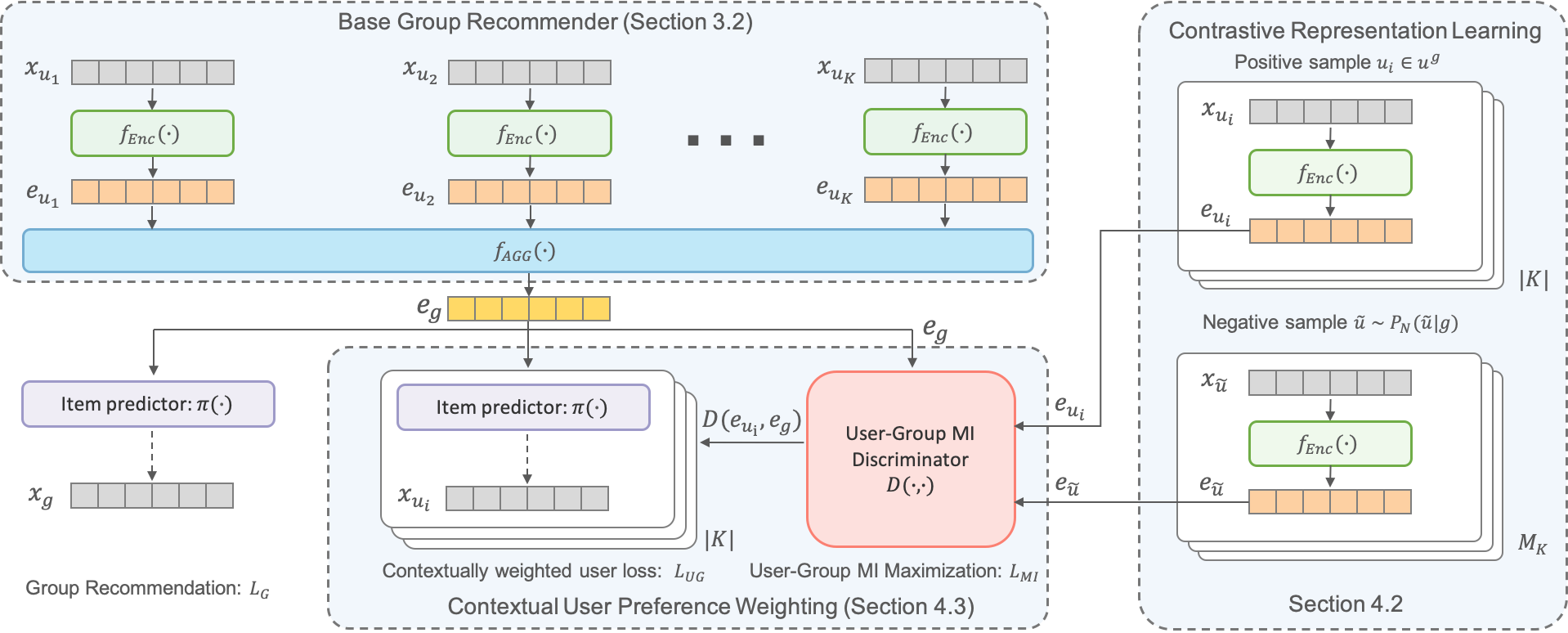Contributors: Aravind Sankar (asankar3@illinois.edu).
Aravind Sankar, Yanhong Wu, Yuhang Wu, Wei Zhang, Hao Yang and Hari Sundaram, "GroupIM: A Mutual Information Maximization Framework for Neural Group Recommendation", International ACM SIGIR conference on research and development in Information Retrieval, SIGIR 2020, Virtual Event, China, July 25-30, 2020.
This repository contains a PyTorch implementation of Group Information Maximization (GroupIM) - a neural framework for recommending items to groups of users. GroupIM has three modules: user preference encoder, group preference aggregator, and a training objective over user and group interactions with mutual information maximization. GroupIM supports arbitrary preference encoder and aggregator architectures for group recommendation.
The code has been tested running under Python 3.6 with the following packages installed (along with their dependencies):
numpy==1.18.1
pandas==1.0.3
scikit-learn==0.23.1
scipy==1.4.1
torch==1.1.0
To guarantee that you have the right package versions, you can use Anaconda to set up a virtual environment and install the above packages.
This repository includes one dataset Weeplaces for POI recommendation to groups of users.
The set of all groups are randomly partitioned into training (70%), validation
(10%), and test (20%) sets, while individual user-item interactions of all users are used for training
The validation and test sets contain strict ephemeral groups (i.e., a
specific combination of users) that do not occur in the training set.
In order to use your own data, you have to provide the following files:
-
train_ui.csv: a csv file specifying the training set of user-item interactions (one pair per line) where each line contains a(u, i)pair. -
val_ui_tr.csv, test_ui_tr.csv: csv files specifying fold-in item interactions for the validation and test sets of users. -
val_ui_te.csv, test_ui_te.csv: csv files specifying held-out item interactions for the validation and test sets of users. This set may be used to evaluate user-level item recommendation performance. -
train_gi.csv, val_gi.csv, test_gi.csv: csv files specifying group-item interactions (one pair per line) where each line contains a(g, i)pair. -
group_users.csv: a csv file specifying group memberships of all users and groups in the dataset where each line contains a(g, u)pair indicating that userubelongs to groupg.
-
data/contains the necessary input file(s) for each dataset in the specified format. -
models/contains:- GroupIM model (
models.py); - user preference encoder (
encoder.py) - group preference aggregator (
aggregators.py) - discriminator for mutual information estimation and maximization (
discriminator.py)
- GroupIM model (
-
utils/contains:- mini-batch loaders for user-item interactions (
user_utils.py); - mini-batch loaders for group-item interactions (
group_utils.py);
- mini-batch loaders for user-item interactions (
-
eval/contains:- ranking metrics NDCG and Recall at K (
metrics.py); - helper functions to evaluate recommendation performance (
evaluate.py);
- ranking metrics NDCG and Recall at K (
To train and evaluate the model (e.g., on weeplaces), please run
python train.py --dataset weeplaces --cuda --pretrain_user --pretrain_miNote: The model is not deterministic. All the experimental results provided in the paper are averaged across multiple runs.
If you make use of this code or the GroupIM algorithm in your work, please cite the following paper:
@inproceedings{sankar2020groupim,
title = {GroupIM: A Mutual Information Maximization Framework for Neural Group Recommendation},
author = {Sankar, Aravind and Wu, Yanhong and Wu, Yuhang and Zhang, Wei and Yang, Hao and Sundaram, Hari},
doi = {10.1145/3397271.3401116},
booktitle = {Proceedings of the 43rd International ACM SIGIR Conference on Research and Development in Information Retrieval},
pages = {1279--1288},
year = {2020}
}
